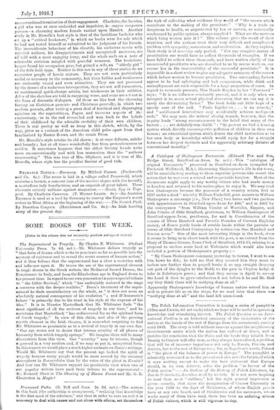SOME BOOKS OF THE WEEK.
[Notice in this column does not neeessarild preclude suh:e2usat reoies .1
The Supernatural in Tragedy. By Charles E. Whitmore. (Oxford University Press. 7s. 6d. net.)—Mr. Whitmore defines tragedy as "that form of drama which seeks to penetrate as far as possible into the mystery of existence and to reveal the secret sources of human action," and it thus follows that the supernatural has a close a- sociation with and influence upon it. He traces the use of the supernatural element In tragic drama in the Greek writers, the Mediaeval Sacred Drama, the Renaissance in Italy, and from the Elizabethan age in England down to the present time. In regard to our own generation he pays a special tribute to "the Celtic Revival," which "has undeniably restored to the stage a converse with the deeper realities." Ibsen's treatment of the super- natural he finds unsatisfactory on the whole, as "it does not seem an absolutely natural consequence of his evolution " ; and D'Annunzio's failure "is primarily due to his trust in his style at the expense of his Idea." It is in Maurice Maeterlinck that Mr. Whitmore finds "the most significant of all the revivers of tragedy in our time," and he maintains that Maeterlinck "has rediscovered for us the spiritual form of Greek tragedy." In view of this claim, and also of the growing mystic element in the Irish theatre, it is somewhat surprising to find Mr. Whitmore so pessimistic as to a revival of tragedy in our own day. " Our age seems not to desire that intense scrutiny of all phases of humanity from which tragedy springs." We imagine there will be many dissentients from this view. Our " scrutiny " may be intense, though espressed in a very modern and, if we may so put it, unmystical form. In this respect we would place a much higher estimate on Ibsen's writings. Would Mr. Whitmore say that the present age lacked the spirit of tragedy because many people would be more moved by the uncanny atmosphere in Rosmersholm than by the voice of the ghost in Hamlet? And how can Mr. Whitmore support his pessimistic view when two of our popular writers have paid their tribute to the supernatural— Mr. Bernard Shaw in The Showing up of BialiC0 P08714 and Mr. G. K. Chesterton in Magic ?










































 Previous page
Previous page